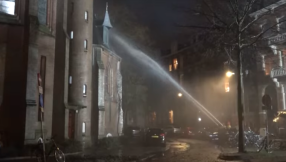
Concerns have been raised about the free speech implications of plans to extend hate crime legislation in Scotland.
The proposed Hate Crime and Public Order (Scotland) Bill "seeks to modernise and extend existing hate crime legislation".
One proposed addition to existing laws would create new offences relating to stirring up hatred that apply to all listed characteristics including age, disability, religion, sexual orientation, transgender identity and variations in sex characteristics. At present, the offences relate only to race.
The Scottish Parliament's Justice Committee has been seeking views on the proposals and will analyse responses in the coming months.
The Free Church of Scotland was among the respondents to the public consultation, which closed last Friday.
In its response, the Church said it was "very concerned about the Bill's significant detrimental effect on free speech within our society", and that the current laws were already sufficient to protect against threatening or abusive behaviour.
The Church further warned that the Bill could result in the silencing of debate and legitimate criticism.
"We recognise that there are issues in our society of genuine hatred which are wrong and should be addressed. However, we are also concerned by the tendency of some to see any criticism of their beliefs and opinions as amounting to hatred," it said.
"We believe it is possible to disagree with someone while loving and respecting them as a person. Indeed, we believe that an understanding that people hold a wide range of opinions and beliefs on a wide range of issues, and acceptance (even encouragement) of free debate about such opinions and beliefs is an essential feature of a mature democratic society.
"The issue we have with this particular Bill is that it encourages a recourse to law where there is a legitimate disagreement.
"This silences debate and prevents reconciliation between people. It undermines any efforts to understand those you disagree with."
Others have raised similar concerns about the proposed law.
Top lawyer Thomas Ross QC suggested in comments to the Daily Mail that the Bill may create a climate of self-censorship.
"If the Scottish Government is going to create an offence that can be committed unintentionally, drafters of the legislation have to make the essentials of the offence crystal clear. They've failed to do that," he said.
"The language used in the Bill is so difficult to understand that it will be impossible for the man or woman in the street to know when the line is likely to be crossed."
He added: "As a result a lot of interesting debate simply will never take place."
Dr Stuart Waiton, a senior lecturer in sociology and criminology at the University of Abertay in Dundee, wrote in the Scottish Herald newspaper that the Bill is "possibly be the most illiberal and intolerant piece of legislation in any liberal democracy, worldwide", with wording that is "incredibly flexible and subjective".
He said that the legislation encroaches so far into the private sphere that it is "opening up the possibility of comments at dinner parties becoming criminal offences".
"Unlike the laws in the rest of the UK, where the crime of 'stirring up' hatred needs evidence that it is deliberate and also threatening, here we have a new law that potentially requires neither," he said.
In an interview on TalkRadio, he elaborated further about the possible threat to the free speech of Christians.
"If it stands as is, potentially simply having material that could be understood to be hate-based could be a criminal offence," he said.
"That begs the question to me about the Bible to start with, in terms of what some people might think is hateful."













